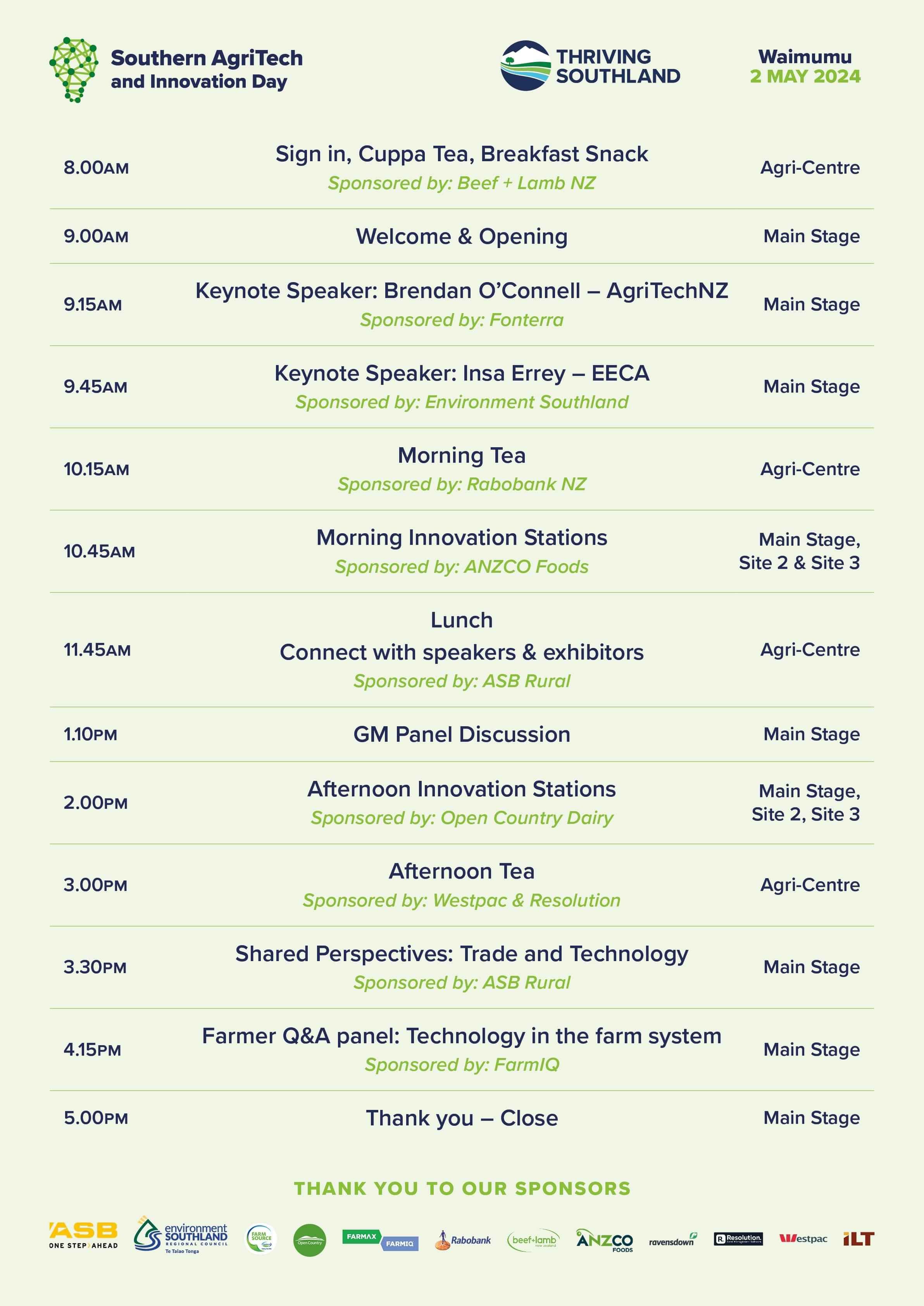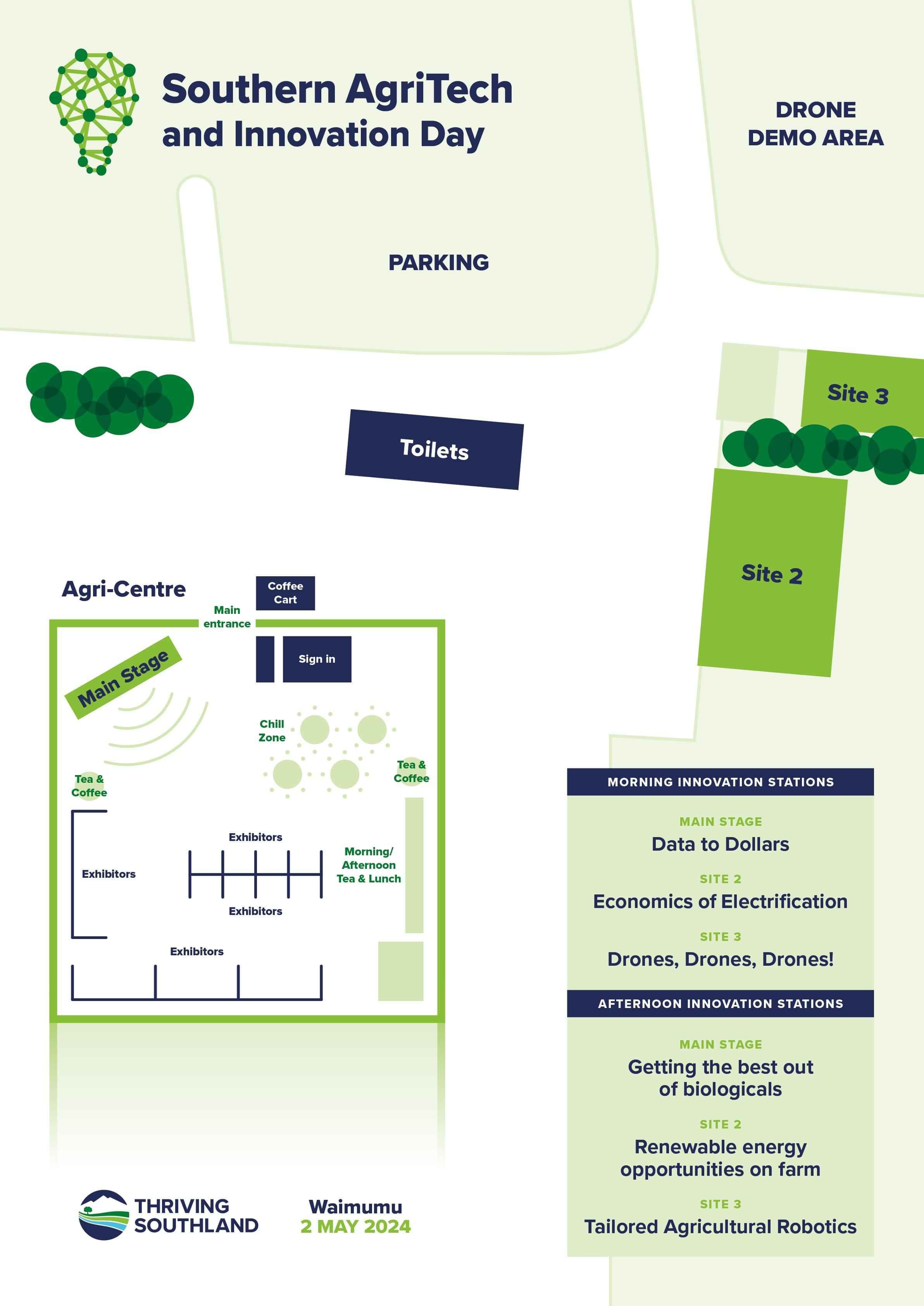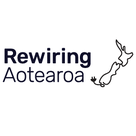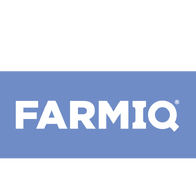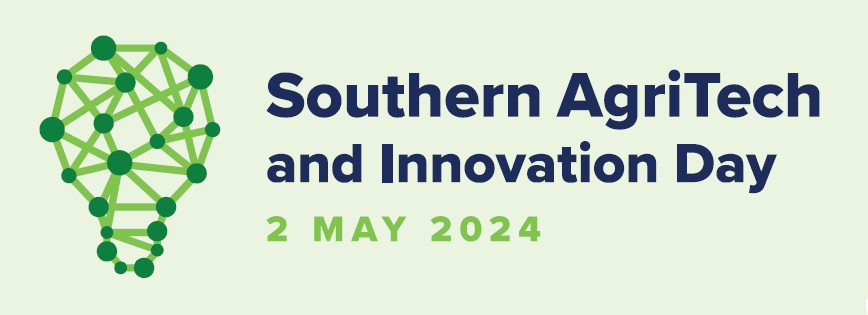
Thank you! We had a fantastic day.
We're really proud of how the first Southland AgriTech and Innovation Day went. A big thank you to everyone who participated; your enthusiasm, questions and presence made the day a success.
We would also like to take this opportunity to extend our gratitude to all who made the event possible! Special thanks to the speakers and their organisations for coming down south and sharing with us all your expertise, ideas and knowledge. You've sparked engaging discussions and left farmers wanting more!
A huge thanks to our sponsors for their support in delivering the day. We're so lucky to have such fantastic local support for the work of the Catchment Groups and Thriving Southland.
Thanks also to the exhibitors for setting up and engaging with all participants. It was invaluable for everyone to join the dots, get next steps in place, and turn ideas into action.
To those who provided feedback at the end of the day, thank you! If you missed it, we'd love to hear your thoughts on the event. Please fill out our feedback form here: https://forms.office.com/r/h8GXeRSidj
If you have any questions, please feel free to give us a call.
Thanks again from the Thriving Southland team and the Gore Catchment Group.
Resources from the Day
Below are some of the resources from the day, including presentations from our speakers and innovation stations. Feel free to share.
Keynote Speaker: Brendan O'Connell - AgritechNZ
Genetic Modification Panel Discussion
Farmer Q&A Panel: Technology in the farm system
Keynote Speaker: Insa Effrey - EECA
Shared Perspectives: Trade and Technology
Morning Innovation Stations
Station 1 - The Economics of Electification
Mike Casey - Rewiring Aotearoa
Dr Hoani Cooper - NES Ltd
Station 2 - Data to Dollars: Enhancing Farm Profitability with Soil Radiometrics
Dr Clint Rissmann - Land and Water Science
Station 3 - Drones, Drones, Drones
Airborne Solutions, Ferntech, Overview & XAG Drones
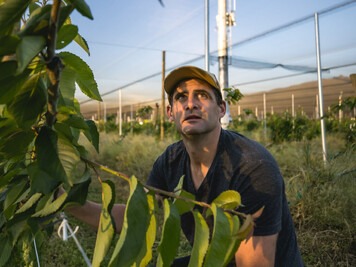
Innovation Station 1 - Mike Casey. The Economics of ElectrificationThe story of building my electric cherry orchard, the facts, figures and profit margins behind it and my mission to electrify as much of NZ as possible.

Innovation Station 2 - Data to Dollars: Enhancing Farm Profitability with Soil Radiometrics Presented by Dr. Clint Rissman, Land & Water Science and Glen Smith, Rangitata Dairies GroupJoin the Land and Water Science team to dig into the significant influence of the landscape when it comes to both environmental outcomes and production opportunities. The same landscape factors (e.g., soil type, topography) that limit yield or production are often associated with increased environmental risk. Having a high resolution understanding of the landscape is critical to increase efficiency and reduce costs. During this presentation we will explore what radiometric surveying is and how it can be used to enhance both farm profitability and sustainability. We will delve into how Rangitata Dairies have utilised high resolution radiometric survey data to identify their challenges and opportunities, prioritise where investments to mitigate environmental impacts will be most effective, and to identify where and how improvements in production can be achieved. We will touch on the possibilities of improving fertiliser use through variable rate applications, improving water use through variable rate irrigation, supporting farm dairy effluent management, and better soil classifications that can be used to refine your farm system.
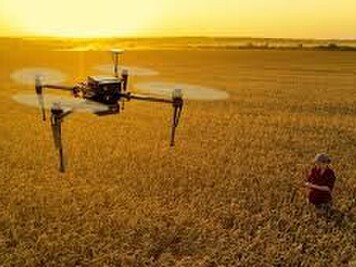
Innovation Station 3 - Drones, Drones, Drones.Join us for an exciting workshop presented by Airborne Solutions and Ferntech, where we delve into the innovative world of drones in agriculture. Discover practical solutions for Southern farmers, including stock management, mapping, fertilizer and chemical application, variable rate options, and cost-effective native seeding. Explore the endless opportunities UAVs offer on the farm, and uncover cool technological solutions that can revolutionize your agricultural practices. Don't miss this opportunity to unlock the full potential of drones in farming!
Afternoon Innovation Stations
Station 1 - Renewable energy opportunities on farm
Insa Errey - EECA
Station 2 - Getting the best out of biologicals - Innovative new biostimulants and biofertilisers for drop and pasture establishment and growth
Dr Alison Stewart - FAR
Station 3 - Tailored Agricultural Robotics
Scott Spooner - SPS Automation
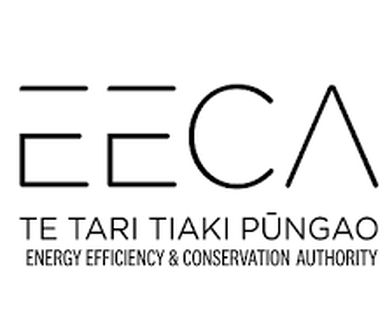
Innovation Station 1 - Insa Errey (EECA). Renewable energy opportunities on farmInsa is the Sector Decarbonisation Programme Manager at EECA (Energy Efficiency and Conservation Authority) - a government agency which supports mobilising New Zealanders to be world leaders in clean and clever energy use. Insa aims to drive transformation change at a sectorial level through energy efficiency and transitioning to low emissions technology. Specialising in providing guidance and analysis on energy behaviour, jointly with innovation and technology changes, Insa’s career has seen her both in the public and private sectors leading change management within the energy, carbon and sustainability space. Insa holds a Chemical and Biomolecular BE (Hons) from Sydney University with a strong passion for humanitarian engineering and advocacy for bioenergy use.
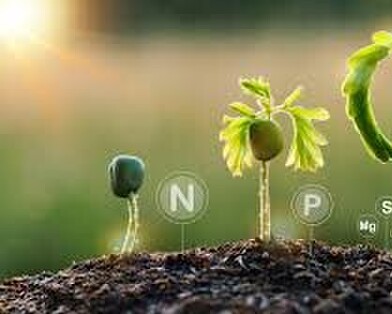
Innovation Station 2 - Dr. Alison Stewart (FAR). Getting the best out of biologicals - Innovative new biostimulants and biofertilisers for crop and pasture establishment and growth NZ farmers have been reliant on synthetic fertilisers to deliver their crop/pasture nutrition requirements for decades but now the door is opening to a whole range of new bio-based products that can deliver yield and quality benefits. This presentation will cover some of the new biological products and technologies that can fix nitrogen, enhance growth and protect against both abiotic and biotic stresses. What are they, how do they work and are they available in NZ?
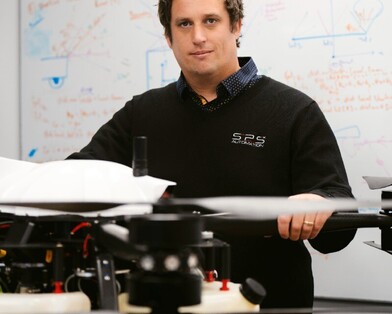
Innovation Station 3 - SPS Automation. Tailored Agricultural RoboticsSPS Automation is a Christchurch-based R&D company specialising in tailored airborne and ground-based automated robotic systems. Our core technology is bespoke sensor-based AI and the design/integration of the robots that use it. SPS Automation has an in-house rapid prototyping fabrication lab, which includes equipment like a machine learning lab, 3axis/5axis CNCs, 3D printers, a composites workshop, and an electronics lab. If it flies, rolls or moves and needs to think, then we can build it.
Speakers

Brendan O'Connell
Brendan is the Chief Executive of AgriTech New Zealand, an independent membership organisation connecting innovators, investors, regulators, researchers, enablers, and practitioners. The organisation promotes collaboration across the agritech ecosystem and seeks to advance conditions for growth and impact in and from Aotearoa, New Zealand.
Brendan has been involved in technical, commercial, and leadership aspects of product innovation at a senior executive level for several international businesses. He has worked in biomedical, telecoms, marine/consumer electronics, and agritech and led product development teams in NZ, Australia, the UK, Europe, and the US.
Over the last 17 years of work in the agritech sector, Brendan has developed a strong affinity with the primary sector (its people and purpose) and the innovators who transform its capability and impact.
He likes to open doors, connect businesses with the right people, and provide them context and insights to identify opportunities they might have yet to consider themselves.
Presentation topic: The role of agritech in unlocking new value for New Zealand. Brendan will discuss the global and local effects of agritech solutions. He will provide examples illustrating potential future scenarios and examine New Zealand's potential to lead in these practices.
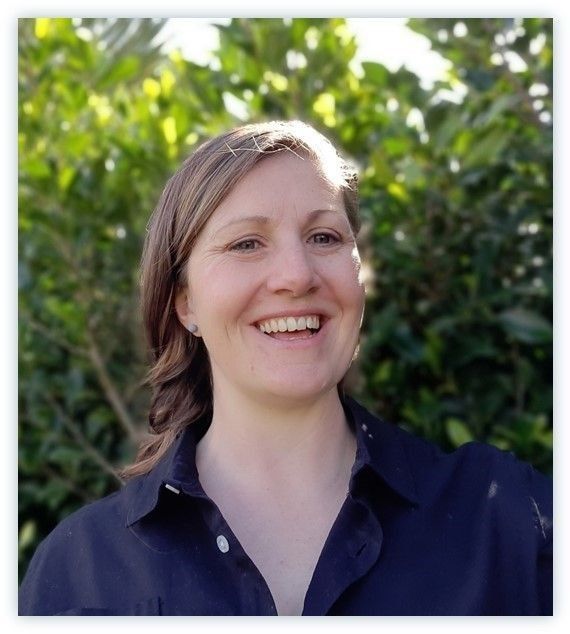
Insa Errey
Insa is the Sector Decarbonisation Programme Manager at EECA (Energy Efficiency and Conservation Authority) – a government agency which supports mobilising New Zealanders to be world leaders in clean and clever energy use. Insa aims to drive transformation change at a sectorial level through energy efficiency and transitioning to low emissions technology. Specialising in providing guidance and analysis on energy behaviour, jointly with innovation and technology changes, Insa’s career has seen her both in the public and private sectors leading change management within the energy, carbon and sustainability space. Insa holds a Chemical and Biomolecular BE (Hons) from Sydney University with a strong passion for humanitarian engineering and advocacy for bioenergy use.
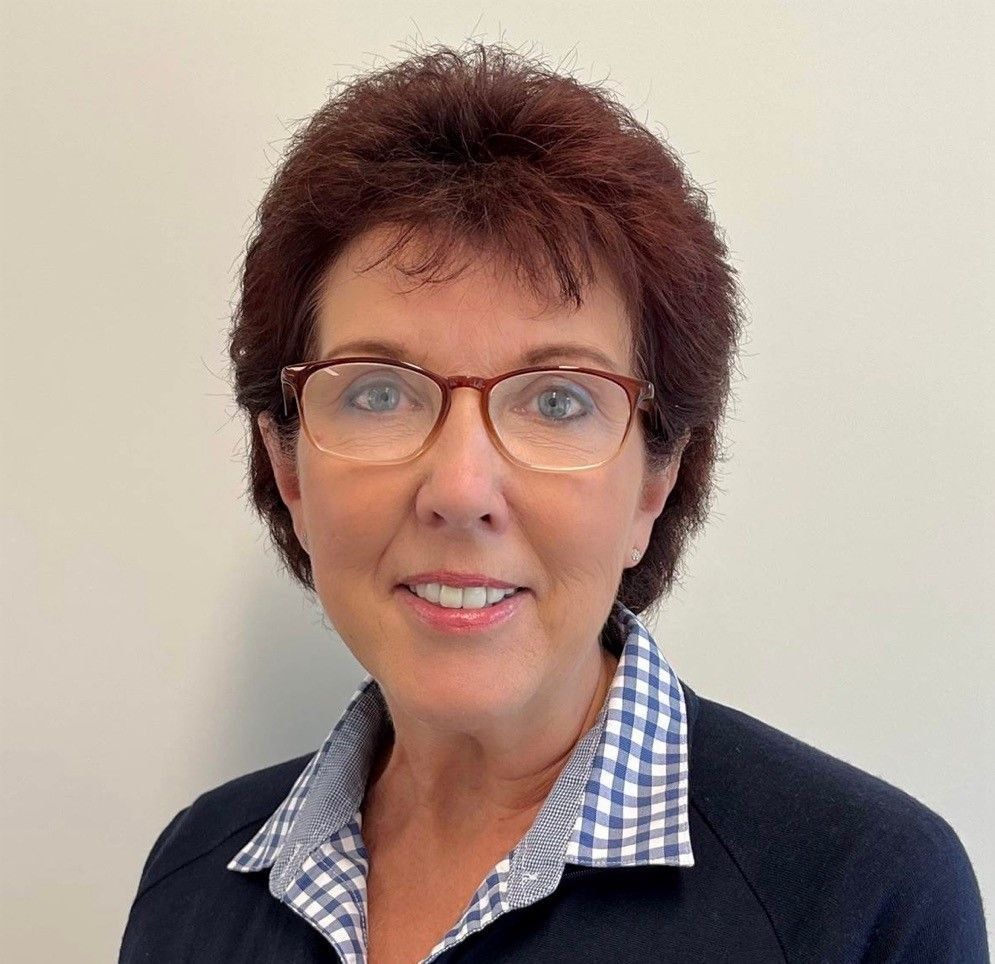
Professor Alison Stewart
Professor Alison Stewart is the CEO of the Foundation for Arable Research. She is an applied plant scientist with a 38 year career focused on sustainable food production. Her research expertise includes: plant biosecurity, crop protection, soil biology and plant biotechnology. In particular, Alison is internationally recognised for her work on the development of biopesticides for the control of plant pests and diseases and she has successfully commercialised a number of products for the horticulture, arable and nursery sectors in New Zealand and the USA. Professor Stewart is a Fellow of the NZ Institute for Agricultural and Horticultural Science and the Australasian Plant Pathology Society and was elected a Companion of the NZ Order of Merit in 2009 in recognition of her services to plant biology.
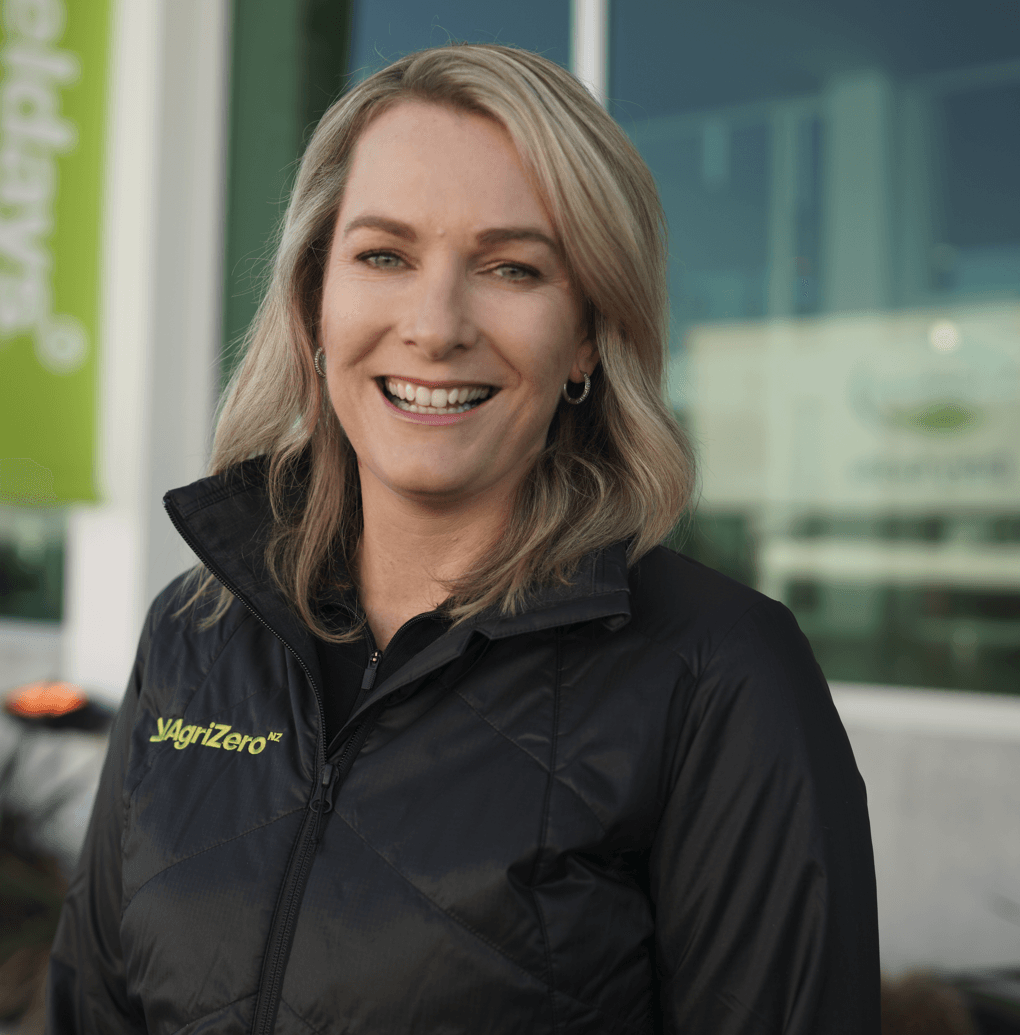
Ruth Leary
With a diverse background spanning senior commercial roles in prominent agribusinesses, speciality ingredients, and export firms, Ruth now serves as the Head of Strategy & Engagement at AgriZeroNZ. AgriZeroNZ is a public-private partnership between the New Zealand Government and agribusiness investing to accelerate tools and tech for farmers to help them reduce emissions. Originally from a sheep, beef and deer farm in Opio, Southland, Ruth is committed to driving value in the agriculture sector.
Ruth has worked as the NZ Sales Director at Archer Daniels Midland, a Regional Sales Manager for Lesaffre, and Director of Strategic Projects at Synlait. She’s also formerly helped write a recipe book for Fisher & Paykel and worked in the technical brewing team at Lion focused on yeast and fermentation.
Ruth holds a Bachelor's degree in Food Science & Nutrition, postgraduate qualifications in Food Science, and a Master of Business Administration from Otago University, as well as a Diploma of Brewing from the Institute of Brewing and Distilling.
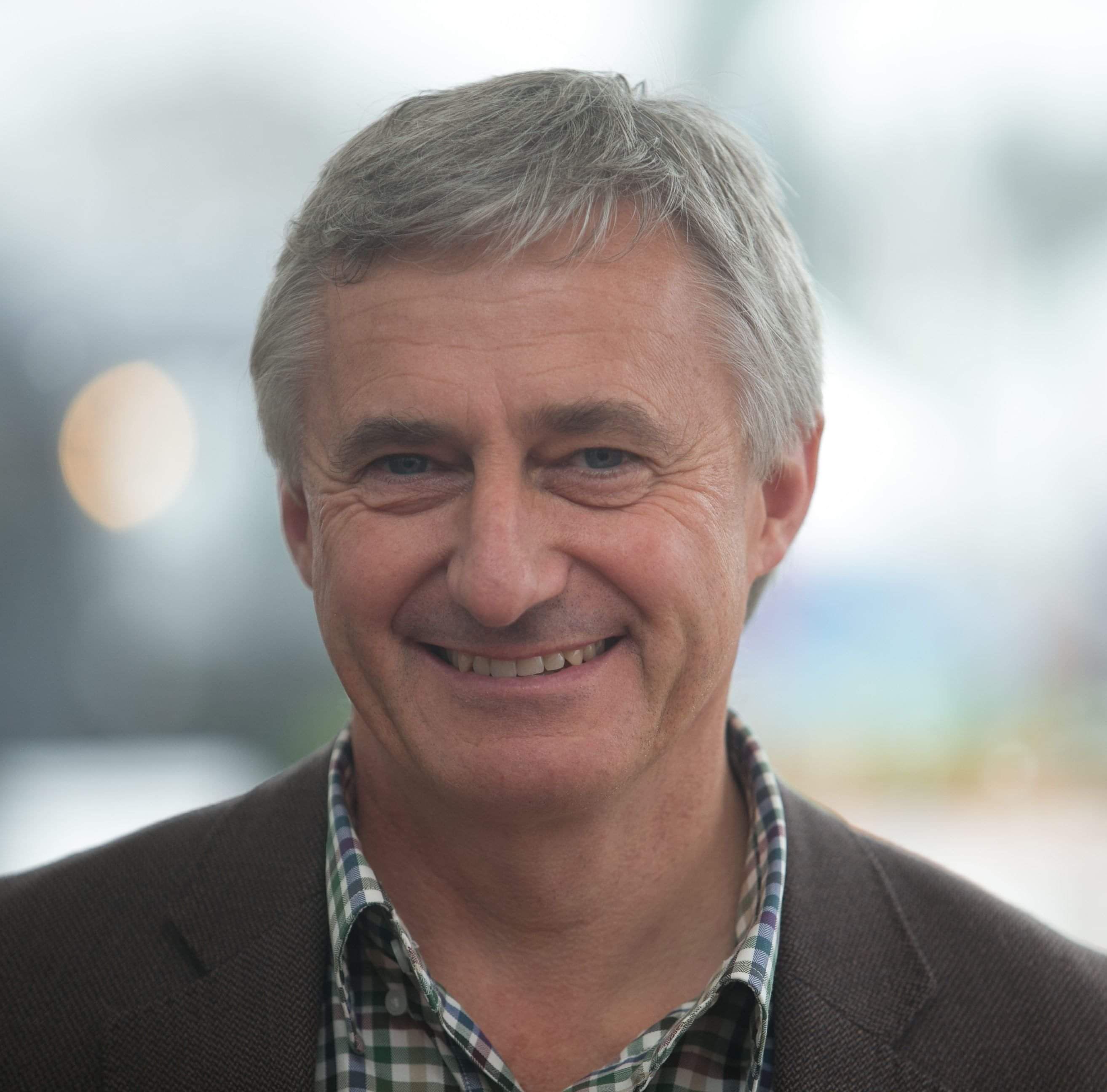
William Rolleston
William is co-founder of biotech and vaccine manufacturing company South Pacific Sera Limited - a biotech industry pioneer which grew out of a diversification of his family’s farming business on Blue Cliffs Station.
William has advocated for science, industry and agriculture as the founding chair of New Zealand’s biotechnology industry association (now Biotech NZ) and the Life Sciences Network, as president of both New Zealand Federated Farmers and the World Farmers Organisation, and has advised local and central government on science strategy, economic development and biosecurity through the Science and Innovation Boards, Aoraki Development Trust and as external advisor including to the Governor of the Reserve Bank.
William chairs Genomics Aotearoa, has a degree in medicine, was awarded the Distinguished Biotechnologist of the Year for services to the biotechnology industry in 2009 and inducted into the Biotech Hall of Fame in 2023. In 2019 he received a Special Commendation Award at the South Canterbury Business Excellence Awards for services to local business, was appointed a Companion of the New Zealand Order of Merit in 2017 for services to farming and in 2024 made a Paul Harris Fellow for services to the community.
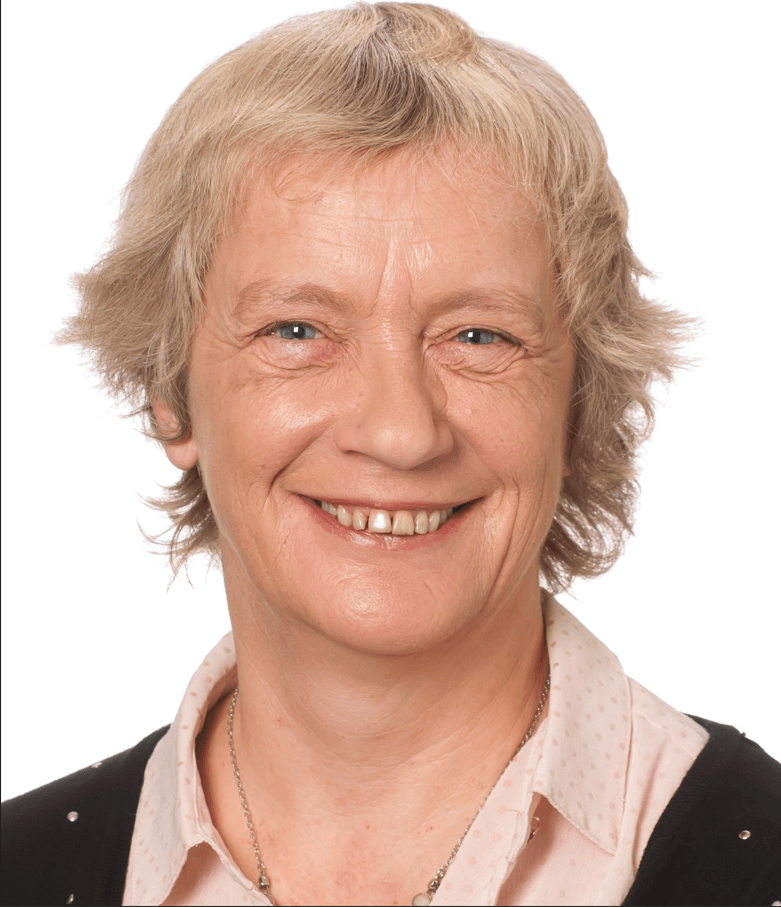
Professor Caroline Saunders
Distinguished Professor Caroline Saunders ONZM FRSNZ
Professor Caroline Saunders research focus is sustainable wellbeing (social, economic, environmental and cultural) impacts of policy and practice. I have undertaken a wide range of economic evaluation studies. This includes increasing primary sector export returns, capturing greater value from global value chains and analysing the value given by consumers to different credence attributes ranging from food safety, benefits of disease control to environmentally ‘cleaner’ and more sustainable production. She has undertaken research for a wide range of private and public bodies both in NZ and overseas.
These include the EU commission, DEFRA, FAO, OECD, MPi, MFAT, Treasury, MFE, MBIE, NZTE, Fonterra, MOT, Beef and Lamb and various other industries and sector groups. She is an appointee on the Board of Wool Research of New Zealand and a member of the Reserve Bank Monetary Policy Committee. She was awarded the New Zealand Order of Merit in 2009, the NZIER Economist of the Year in 2007 and made a Fellow of The Royal Society of New Zealand in 2021.

